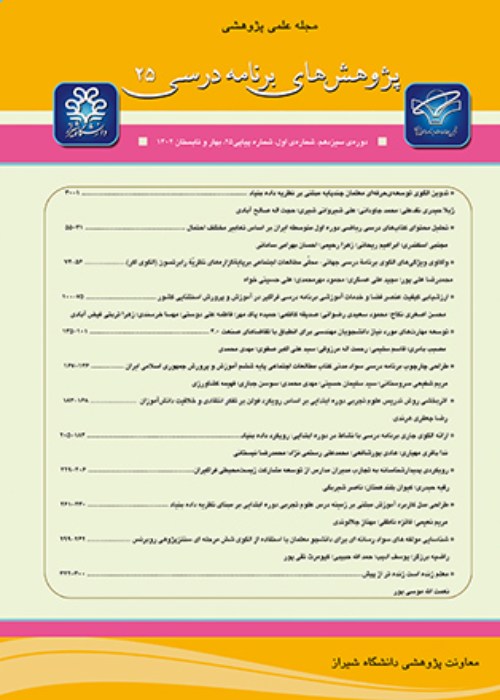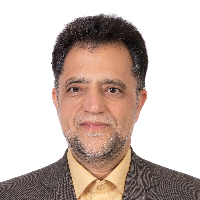Developing a Model of Faculty Members’ Decision-making in Curriculum Development: A Grounded Theory Approach
An educational setting is a creative and unique place in which students’ development and proper orientation take place. Faculty members’ daily lives include constant decisionmaking, which is a complex process of contemplation, evaluation, and analysis. Every instructional action is the outcome of a decision made, either consciously or unconsciously, by teachers following extensive processing of available information. Faculty members make decisions about lesson content, class motivation, resource use, incentives or disincentives, and numerous other issues involved in the daily routine of classrooms. These decisions can, but not necessarily, have far-reaching and profound consequences for the success or failure of the faculty’s daily work and future activities. As a result, the attempt to improve the faculty’s decision-making in curriculum planning is aimed at offering crucial solutions to improve educational outcomes, student performance, and the higher education system. A complex and interconnected set of internal and external forces, such as historical, ideological, cultural, social, political, economic, individual, and organizational factors, affect the faculty members’ curriculum planning decisions. Thus, a deep understanding of these factors can lead to the identification of needs, limitations, and opportunities, which, in turn, can affect faculty members’ curriculum development and innovation. As a result, the current study sought to develop a model of the processes involved in Birjand University faculty members’ decision-making in curriculum development. This study used a qualitative approach based on Strauss and Corbin’s reformulated grounded theory. Grounded theory, which is based on a set of empirical relevant data, is a method used to gain knowledge about a subject that has not been thoroughly researched before and for which the existing knowledge is limited. In implementing the grounded theory, the researcher must use a specific technique for analysis, use phased coding (open, axial, and selective), and present the results in the same paradigm model. The statistical population of this study included all Birjand University faculty members, of which 21 were chosen through purposeful sampling. The inclusion criteria were having more than 5 years of experience and teaching at undergraduate and graduate levels. Sampling continued until theoretical saturation was reached. Data were collected through semistructured interviews with 21 faculty members from various fields (i.e., educational sciences and psychology, basic sciences, literature, and engineering) that had sufficient experience to provide researchers with expert opinions pertinent to the research topic. Four criteria introduced by Lincoln and Guba (1985) were used to ensure the trustworthiness of the findings. These included credibility, transferability, dependability, and confirmability. Member-checking, or participant validation, was used to ensure credibility. The findings were shared with experts to make them transferable. Concerning dependability, the inter-coder agreement was used. Finally, peer review and feedback were used to enhance the confirmability of the results. The results revealed 32 core concepts and 13 categories, which were collated to develop a paradigm model. The following themes constituted the model: lack of scientific rigor in classroom decision-making (as the core category), causal conditions (extraorganizational, environmental, and motivational factors), contextual factors (behavioral factors, programmatic factors, and support factors), facilitating intervention conditions (managerial, structural, and behavioral factors), limiting intervention conditions (organizational-environmental challenges and implementation obstacles), strategies (decision-making based on previous structures, situational decision-making, conservative decision-making, and interactive decision-making), and the consequence (decreased effectiveness and efficiency) of the organization. Based on the findings of this study and the significance of faculty members’ decisionmaking, it is necessary for universities to improve the faculty’s level of knowledge and their “scientific” decision-making skills by implementing an educational program and providing them with the necessary support. In this regard, since faculty members’ decisions can influence students’ educational and business future, it is suggested that the faculty members’ decisions concerning curriculum development be considered and analyzed from a cultural, psychological, economic, and sociological standpoint. Furthermore, due to limited research on the intuitive and logical factors driving the faculty members’ decision-making, more research is needed to focus on faculty members’ curriculum development decisions in relation to students’ characteristics, class dynamics, and organizational context. Also, the nature of these decisions, the factors affecting them, and their effect should be examined. The findings of this study can deepen understanding of and shed light on faculty members’ and teachers’ decision-making in the classroom.
- حق عضویت دریافتی صرف حمایت از نشریات عضو و نگهداری، تکمیل و توسعه مگیران میشود.
- پرداخت حق اشتراک و دانلود مقالات اجازه بازنشر آن در سایر رسانههای چاپی و دیجیتال را به کاربر نمیدهد.




